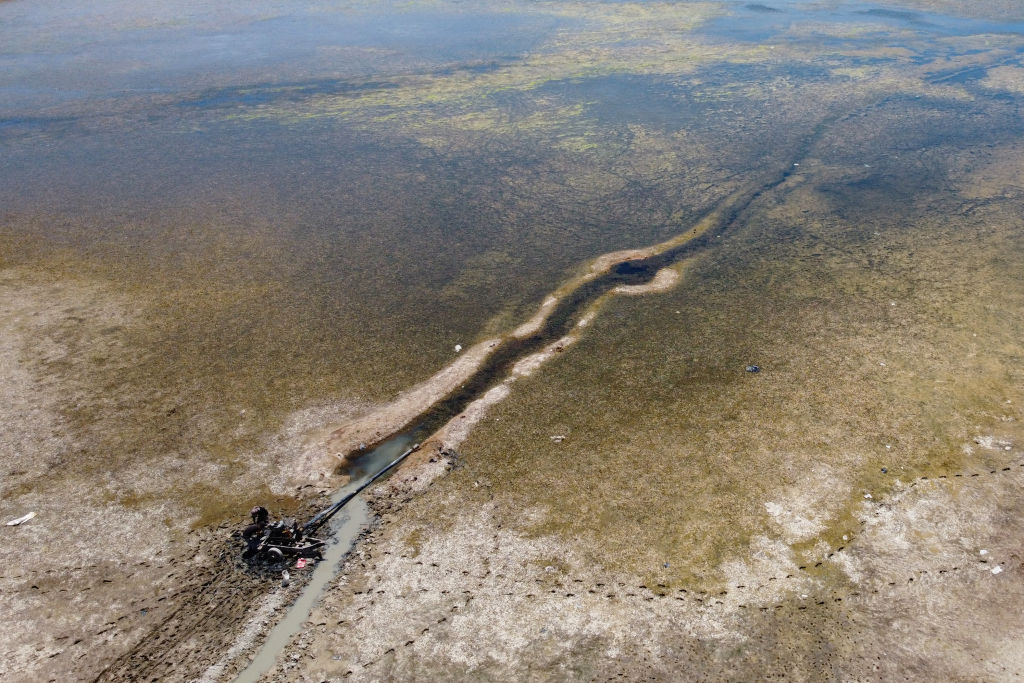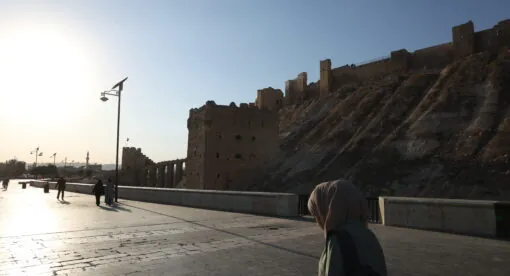Syrian President Bashar al-Assad is gradually re-entering the international community, most recently with the Arab League’s decision to welcome him to its May 2023 meeting for the first time since 2011. Turkey’s tentative steps toward normalization with Syria have generated significant media attention, largely focused on the implications for regional geopolitics, refugee repatriation, and a potential end to Turkey’s open-ended military occupation of large swaths of northern Syria.
One of the highest-stakes issues affected by Turkey’s efforts at rapprochement is also one with a low profile: Syria’s dwindling access to critical fresh water from the Euphrates. Turkey is increasingly siphoning this water for domestic use and to put political pressure on the U.S.-allied Syrian Democratic Forces (SDF). Coupled with the increasingly acute effects of climate change in the Tigris-Euphrates River basin, Turkey’s actions have intensified the unprecedented drought in Syria. Dwindling water resources threaten to worsen food insecurity in Syria, creating pressure that could contribute to new waves of refugees leaving the country. The crisis’s effects are concentrated in the country’s northeast, where the SDF is detaining thousands of ISIS fighters and conducting regular counterterrorism operations with U.S. forces. The water scarcity crisis thus has direct effects on U.S. security and humanitarian objectives in the region.
Water sharing is likely to be a key point of contention between Turkey and Syria with broad humanitarian and security implications. The stability of the region will depend, in part, on access to water in the future. Given both the United States’ opposition to normalization with the Assad regime and the structural barriers to normalization, policymakers in Washington should work to mitigate water sharing challenges in ways that do not rely on a full restoration of diplomatic and economic ties.
Tigris-Euphrates Water Disputes
The Tigris and Euphrates both begin in Turkey and flow through Syria and Iraq. Turkey provides over 98% of the Euphrates’ discharge and about 50% of the Tigris’ discharge. The remaining flow of the Tigris comes from Iraq (about 40%) and Iran (about 10%). Together, the Tigris, Euphrates, and their tributaries serve as water sources for about 90 million people. The waterway is vital for Iraq and Syria, where about 80% of the population live with high or very high water stress. The Tigris-Euphrates provides over half these countries’ water resources. Syria’s agricultural heartland, in the country’s northeast, is highly dependent on the Euphrates River, and a series of hydroelectric dams along the Euphrates has supplied millions of Syrians with electricity. Turkey also uses both waterways as sources of hydropower.
Twelve years of civil war have decimated Syria’s agricultural sector, with a 2021 U.N. study finding that harvests of wheat, Syria’s most cultivated cereal, were down to a quarter of prewar levels, from 4.1 million tons annually to 1.05 million tons, with stark implications for food security across the country. The decline correlated with a spike in food insecurity. Syria compensated for the shortfall partly through increased imports of wheat from Russia, though a better harvest in 2023 has alleviated some concerns in the short term. Water sharing challenges between Turkey and Syria have been key to this decline: Turkish dams upstream on the Euphrates reduced the river’s inflow into Syria by 40%, from 500 cubic meters per second to 300 cubic meters per second in Syria’s most fertile agricultural land. In Kurdish parts of Syria, Turkey has been accused of using its dams to cause flooding.
Tension between Ankara and Damascus over Euphrates water-sharing predates the civil war, but the unique dynamics of the conflict have compounded the challenge. As the Kurdish-led Syrian Democratic Forces gradually wrested control of northeast Syria from ISIS between 2014 and 2019, Ankara grew concerned that its southern border would be dominated by groups it saw as overly friendly with the Kurdistan Workers’ Party (PKK), a Kurdish-led insurgent group that Turkey, the United States, and others consider a terrorist organization. Turkey launched a series of offensives into northern Syria in an effort to degrade the PKK, most recently 2019’s Operation Peace Spring. The operation left Turkish-aligned militias controlling the Alouk Water Station, which provides clean drinking water to roughly half a million Syrians. The militias promptly cut off the flow of the water into territory held by the SDF in an apparent bid to put pressure on the U.S.-allied group, and access remains sporadic and unreliable today. The tactic closely mirrors Turkish efforts to control Kurds north of the border as well, where dam construction projects have flooded Kurdish towns and cities and displaced residents.
The disputes over water sharing have stark implications outside northeast Syria. The country’s agricultural production, food security, and access to potable water all hinge on continued flow of the Tigris-Euphrates river system. Northeast Syria has long served as the country’s agricultural hub, a role that has come into question amid its limited access to water. Turkey’s control over the system’s headwaters gives the country leverage over its southern neighbor, which it has repeatedly called on Turkey to restore prewar water levels to the Euphrates River.
Preparing for the Future
The impact of climate change on the Tigris-Euphrates river basin has been dwarfed by the impact of human activity. Hydroelectric dams, strategic siphoning of water, and the “super-exploitation” of freshwater resources for intensive agriculture have all had a devastating effect on the long-term stability of water resources in the region.
The effects in Syria have been particularly devastating. Before 2010, over 90% of people in both rural and urban areas had reliable access to safe water in Syria. As of 2021, half of all water and sanitation facilities had failed to function, damaged by violence or lacking maintenance.
Communities in Syria are also unable to rely on outside organizations to meet their food security needs. According to the World Food Program (WFP), more than half of Syria’s population is suffering from food insecurity – the highest level reported since the war started in 2011. Meanwhile, organizations like the United Nations are increasingly unable to provide adequate aid to mitigate the humanitarian crisis, both due to funding shortfalls and new challenges to cross-border aid delivery into opposition-held territory. With the war in Ukraine and supply chain breakdowns, WFP has been “forced to progressively reduce the size of its food rations.” Syrians around the country are already struggling. In 2021, local farmers in Hasakeh province lost over 90% of their harvest to drought. In some parts of the country, farmers have been forced to sell their livestock due to a lack of fodder. And in the north, damage to water and sanitation systems have led to deadly outbreaks of disease.
The effects of climate change will likely grow in frequency and severity, and prolonged droughts and erratic rainfall are almost certain to exacerbate long-running problems to previously unseen levels. Climate change will increase the challenge to sustain livelihoods that are based on agriculture, likely accelerating urbanization and migration. These risks are especially acute in Iraq and Syria, which have large populations of small farmers and agriculture workers. In both countries, crop production is the dominant method of earning a living. In turn, the increasing rate of urbanization will place stress on cities’ water systems.
Looking toward the future, riparian nations along the Tigris-Euphrates have a diverse set of capabilities and challenges. Syria and Iraq lack critical water infrastructure, with construction urgently needed on irrigation systems and wastewater treatment. As Arab countries bring Assad back into the fold, donors from the Gulf and other international organizations have an opportunity to support these critical humanitarian repairs and construction projects.
Recommendations
The United States remains firmly opposed to normalization with Assad, but it has strategically shifted its sanctions policy to mitigate humanitarian challenges in the past two years. Most recently, it lifted sanctions related to disaster relief to speed up the response to the February earthquake that struck southern Turkey and northwest Syria. In 2022, Washington also lifted sanctions on northeast Syria to help the region rebuild after years of occupation by ISIS. The latter move brought no discernible changes to outside investment in the region, despite the Biden administration explicitly authorizing agricultural investment that could have helped the region use existing water resources more efficiently and sustainably. Given existing security risks and the extensive sanctions that still apply to foreign investment in the country, investors remain lukewarm on even ostensibly permitted activities, such as investments in new irrigation projects, that might mitigate water sharing challenges.
Policymakers have an opportunity to work with interested investors in the Gulf and elsewhere to reassure them about their concerns and potentially issue new, more targeted licenses permitting activities focused on water security. Given the challenges that water security in Syria pose for U.S. interests on a humanitarian and security level, this may be the most straightforward way to mitigate future risks without shifting broader U.S. policy on normalization.
The international community can also boost the impact of its investments in Syria and Iraq’s water infrastructure by requiring all projects to account for climate change from the outset. Designing projects for a changing climate will help policymakers prioritize water and energy efficiency while accounting for reductions in precipitation and river flow. For example, the International Committee of the Red Cross and the Syrian Arab Red Crescent have partnered to repair water pumps in conflict-affected areas, providing millions of people with access to water. Similarly, the WFP has repaired irrigation canals that support over 17,000 hectares of farming land. These interventions have compounding benefits, enabling farmers to irrigate their land, preventing the spread of disease, and providing safe drinking water. At the same time, adopting a forward-looking posture will also mean preparing for rapid population growth in urban areas and ensuring these areas’ readiness to provide drinking water.
However, the international community must approach investments in Iraq and Syria with an awareness of the ongoing corruption in both Iraq and Syria. In particular, the Assad regime has diverted and weaponized humanitarian aid on numerous occasions. To increase accountability, the international community should look for opportunities to route aid through alternative partners. Given that the SDF-held northeast is the region most affected by this crisis, the United States should look for opportunities to partner with the SDF’s civilian body, the Autonomous Administration of North and East Syria, and direct aid into the country via border crossings from Iraq and Turkey rather than through Damascus.
Turkey, which has an elevated capacity to manage the Tigris-Euphrates water supply through its system of dams, has opportunities to bolster regional stability by helping its neighbors gain sustainable access to water. The United States should leverage Erdogan’s recent reelection and increasing interest in serving as a diplomatic leader in the region. Negotiating the now-defunct Black Sea Grain Initiative demonstrated to Erdogan the advantages of leading diplomatic initiatives in the region. As a result of its involvement in this initiative, Turkey occupied a high-profile position with influence over shipping in the Black Sea waterway. Further, Turkey served as an interlocutor between Ukraine and Russia, in addition to other countries that relied on the initiative for grain and stability. U.S. diplomats should help Turkey see a similar diplomatic and leadership opportunity in helping to manage the Middle East’s emerging water crisis. Recent successes in bilateral negotiations between Turkey and Iraq over similar water-sharing issues highlight the potential for negotiation and diplomatic pressure to alleviate the stress on downstream nations.
Turkey and Iran can both initiate joint water and energy projects with their neighbors. In addition, these countries can benefit both themselves and the region by making more investments in water research and systematic monitoring of the basin. Collaboration with Turkey on monitoring and research appears the most straightforward avenue for U.S. policymakers to begin increasing stability in the Tigris-Euphrates basin. More detailed information about the intensity of the water shortfall and the reasons behind it would offer a pathway for all sides to work toward a solution.
Environmental management and adaptation efforts are hamstrung by the lack of coordination among countries that draw on the Tigris-Euphrates River basin. Turkey is unique among the countries sharing the Tigris-Euphrates resources in terms of state capacity; Iraq and Syria are ill-equipped to manage water resources due to corruption, citizen mistrust, and ineffectual public administration. By working with Turkey to support coordination along the Tigris-Euphrates River basin, U.S. diplomats can advance stability in a region wracked by generations of conflict.
Zoe Robbin is a former non-resident fellow at New Lines, researching the nexus of water and diplomacy. Previously, she was a Fulbright research fellow in Jordan where she focused on climate change, migration, and public policy. She has written for Foreign Policy, Al Jazeera, and New Lines Magazine among other outlets. She also co-leads the Diplomacy working group of Foreign Policy for America’s NextGen network and is a Senior Fellow with Humanity in Action. She tweets at @zoe_robbin.
Calvin Wilder is an Analyst at New Lines, focusing on non-state actors in the Middle East and Central Asia. Prior to joining the institute, Calvin was a Research Assistant at the Washington Institute for Near East Policy’s Program on Arab Politics. He previously worked as a Research Assistant on the Chicago Project for Security and Threats’ Arabic Propaganda Analysis Team. He was also a Boren Scholar in Amman, Jordan, from 2019-2020, working as a research and translation intern at Syria Direct. He tweets at @CalvinWilder.
The views expressed in this article are those of the author and not an official policy or position of the New Lines Institute.







